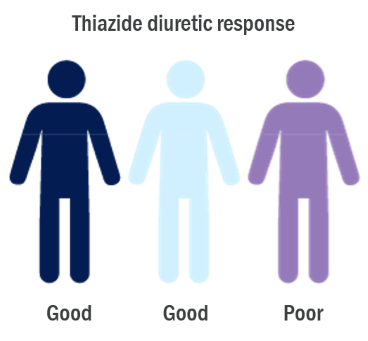Diuretics: Personalized medicine
Diuretics are often the first line of treatment for hypertension, but their effectiveness in terms of BP (blood pressure) lowering is inconsistent. The NEDD4L gene has a strong pharmacogenetic effect on the efficacy of thiazide diuretics. It regulates the expression of the epithelial sodium channel (ENaC) which is responsible for sodium reabsorption in the kidneys. Aberrant ENaC expression has been linked to diseases such as Liddle’s syndrome and pseudohypoaldosteronism. A common NEDD4L variation (-404G>A) inhibits ENaC activity. Consequently, individuals with wildtype genotype have higher salt sensitivities, lower plasma renin levels and a higher blood pressure. As the mechanism of action of diuretics is similar to NEDD4L action, these individuals respond better to the drug. Whereas, thiazide diuretics are not helpful in individuals with variant allele and alternative treatment may be necessary.
Clinical Significance
- NEDD4L gene regulates sodium reabsorption and is associated with predisposition to hypertension
- Genotyping an individual can predict his/her response to thiazide diuretics
- Wildtype allele carriers are predisposed to hypertension and will benefit greatly from thiazide diuretics
- Variant allele carriers may fail to achieve the desired BP control when treated with thiazide diuretics
Personalize Diuretics Test
Patients will be genotyped for NEDD4L -404G>A variation to predict their response to thiazide diuretics. For individuals who do not benefit from thiazide diuretics, recommendations to achieve target blood pressure with alternative antihypertensive medications will be given.
Lower cardiovascular event risk in wildtype NEDD4L individuals with thiazide diuretics – PEAR study,  McDonough CW et al. 2013, Journal of Hypertension
McDonough CW et al. 2013, Journal of Hypertension
- Effect of NEDD4L genotype on blood pressure response to hydrochlorothiazide (HCTZ) in 767 individuals
- Greater blood pressure responses were seen with wildtype genotype (p = 0.0006 and 0.006, SBP and DBP, respectively)
- Significantly increased risk for adverse cardiovascular outcomes were seen with wildtype genotype not treated with HCTZ (odds ratio = 10.65, p = 0.022)
- No significant response seen in variants upon HCTZ treatment
Wildtype NEDD4L individuals benefit from thiazide diuretics with reduced cardiovascular event risk – NORDIL study, Patrik SF et al. 2011, Journal of Hypertension
- Effect of NEDD4L genotype on six-month blood pressure reductions and risk of cardiovascular events in 5151 hypertensives (DBP>100mmHg) randomized to beta-blocker and/or diuretic or diltiazem treatment
- Wildtype genotype, but not variant, treated with beta-blocker or diuretic had greater BP reductions (SBP: p<0.001; DBP: p=0.02)
- Risk of developing adverse cardiovascular events reduced by half in patients with wildtype genotype compared to variant, over a 4.5 year follow-up (95% CI 0.36 – 0.74, p<0.001)
Greater blood pressure reduction in wildtype NEDD4L individuals on thiazide diuretics, Luo F et al. 2009, Hypertension
- A case-control study of hypertension involving 1686 individuals, followed by a 4-week clinical trial of hydrochlorothiazide treatment on 542 patients
- Presence of wildtype allele increases risk of hypertension; odds ratio = 1.39; (p = 0.002)
- Compared to variant, greater blood pressure reductions were seen in patients with wildtype genotype:
‐Decrease of 6.1 mmHg (p = 0.009) in SBP
‐Decrease of 2.7 mmHg (p = 0.027) in DBP
Variant NEDD4L allele offer protection from hypertension morbidities, Dahlberg J et al. 2014, Journal of Hypertension
- 27564 individuals of the Malmo Diet and Cancer Study were genotyped for NEDD4L in relation to high blood pressure and incidence of cardiovascular disease and mortality
- Compared to variant genotype, wildtype genotype was associated with:
‐Significantly increased risk of cardiovascular disease, HR = 1.13
‐Significantly increased mortality, HR = 1.17
‐Higher SBP (p=0.002) and DBP (p=0.025)
